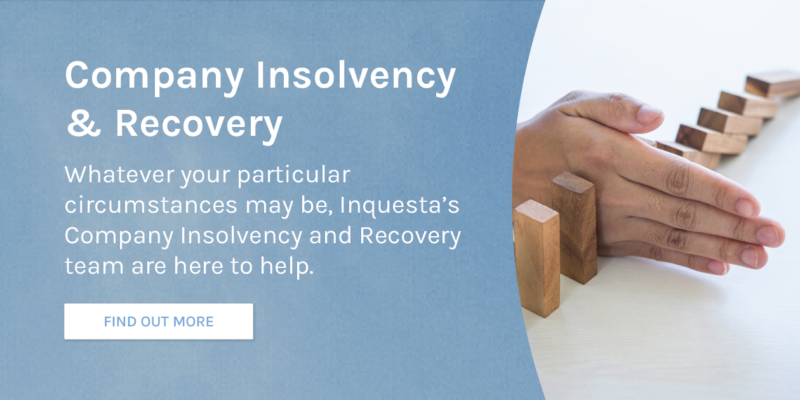Are you a director wondering what happens if a CVA is rejected or a stakeholder grappling with the aftermath of rejection? In the dynamic world of business, Company Voluntary Arrangements (CVAs) serve as indispensable tools for companies looking to tackle serious financial distress head-on. These arrangements offer a lifeline for recovery and offer an opportunity to reverse a dire situation.
However, not every CVA application will secure approval. Therefore, understanding both the reasons behind rejection and what options are still open to you is vital when navigating the aftermath of a rejection.
In this blog, we’ll dissect the reasons behind CVA rejection, unveiling the many pitfalls that could shatter your hopes of recovery. We’ll also look at what options will be available to you if your CVA is rejected.
Why Would My CVA Be Rejected?
If you’re in the process of applying for a company voluntary arrangement, there are a number of things you need to keep an eye on. From concerns over your financial viability, to inadequate creditor support and poorly structured proposals, it’s important that your house is in order when applying for a CVA.
Reasons your CVA proposal might be rejected include:
Concerns Over Your Financial Viability
One of the most common reasons for CVA rejection is that the creditor has doubts about the financial viability of the company. If the creditors feel that the proposed arrangement is not a realistic route to recovery, they may be inclined to vote against it.
Additionally, if creditors fear that the company is simply no longer viable, and that forecasts are unrealistic and unachievable, the chances of a successful deal being struck are slim to none.
Poorly Structured Proposal
Perhaps the most important tip for maximising the chances that your CVA proposal is agreed is proper structure. A well laid out CVA proposal is vital if you want to gain the approval of your creditor(s).
If your proposed terms are unclear, it will often lead to a negative result. Additionally, if proposals are ambiguous, inaccurate, or favour certain creditors unfairly, expect a rapid rejection.

Lack of Support
In order for a CVA to be accepted, it must have the support of the majority of creditors by value. This means that if the creditors that hold the majority of your firm’s total debt do not agree to the deal, there’s a very good chance it will not secure the necessary votes for approval.
Don’t Meet the Legal Requirement
A CVA must adhere to strict legal guidelines, so the process must be followed to the letter. If the proposal you put forward does not meet these statutory requirements, or if the process in the leadup to the vote is flawed in any way, rejection can become a very real possibility.
The Company Hasn’t Been Consistently Compliant
When it comes to HMRC debts, they are only likely to support a CVA if the company in question has been consistently compliant.
This means that any blots on your firm’s ‘copybook’ such as late or incorrect tax filings and returns, could negatively impact your CVA proposal.
Poor Management
If a company’s creditors feel passionately that the business has been poorly and improperly managed, and any deal they make would merely be prolonging this trend, then they might feel it is more beneficial for them to simply ‘cut their losses’ rather than ‘cut a deal’.
If directors are perceived to have taken too much money out of the business in the past, it could leave creditors feeling unfairly treated, further negatively impacting a CVA’s chances of success. Additionally, it is possible that creditors who suspect these issues may want the company to enter into liquidation so the director’s conduct can be officially investigated.
Preference for Alternatives
It is possible that in some situations creditors might wrongly believe that they would get more money out of an alternative solution such as liquidation or administration than they would by just agreeing to a CVA.
Additionally, it is possible that creditors who suspect director wrongdoing or negligence may prefer that the company enter into liquidation in order for the director’s conduct to be officially investigated.
What Happens If My CVA Is Rejected?
The possible consequences of a failed CVA can be significant. For some directors, this will mean seeing the business revert back to being financially unstable, or even going into administration. Other repercussions include the director losing control over their company and their conduct being investigated.
A CVA is a major lifeline for a business faced with serious financial issues. It offers a structured path to recovery while avoiding imminent liquidation. However, the journey is not always a smooth one, and rejection could have profound consequences for a company already on the brink. This can include the following:
Financial Instability Remains
Likely the most obvious and immediate impact if your CVA is rejected is the persistence of the business’ ongoing financial issues.
The purpose of these arrangements is to help manage company debts and regain some semblance of control in a dire situation. So rejection will only result in these challenges remaining, leaving the business increasingly vulnerable to all of the same issues that prompted the need for a CVA in the first place.
Administration Looms
CVA rejection will often coincide with the initiation of administration proceedings. This means that, often immediately following the CVA rejection, an insolvency practitioner will be appointed.
This expert will take control over the firm’s assets in order to assess its financial position and best determine a successful course of action for creditors. This may involve the sale of assets in order to repay outstanding debts, or in more severe cases it can lead to company liquidation.

Directors Lose Control
Company directors, even those who have been actively involved in the formulation of the CVA proposal, can expect to lose control if it is rejected.
As a consequence of a firm entering into administration (see above), an insolvency practitioner will take total charge over the business, making key decisions. These decisions will favour the best interest of the creditors over those of directors and the company itself.
This shift in power can be an incredibly difficult adjustment for directors to go through. Running a company is a highly personal experience, so if a business faces difficulty, the director will want to be able to guide it through tough times — not watch from the sidelines.
Investigation Into Conduct Possible
CVA rejection could also trigger an investigation into the conduct of company directors, particularly if the business enters liquidation.
Authorities may feel the need to scrutinise whether there was any wrongful trading or misconduct that could have led to or in any way contributed to the company’s current financial predicament. Personal liabilities the director could face if their actions are found to be in violation of legal standards include:
- Financial penalties
- Disqualification as director
- Potential liability for company debts
- Criminal liability including jail time
What to do if Your CVA is Rejected
In the immediate aftermath of your CVA being rejected, it is important that you act quickly, as the slower you react to rejection, the less likely the situation can be easily rescued. Navigating post-rejection properly is vital. This includes clear communication with creditors, seeking out professional guidance, and learning from the situation.
When navigating the days following your CVA being rejected, you should prioritise the following:
- Open Communication With Creditors: In the aftermath of rejection, clear and transparent communication becomes paramount. Engage with your creditors to better understand their concerns and explore potential compromises as soon as possible.
- Assess Your Options: It’s important that you act quickly and reassess the options available to you. This can include considering alternative insolvency processes (liquidation, administration, etc.), as well as the implications and pros and cons that come with them.
- Seek Professional Guidance: Expert support can be vital to navigating the landscape post-rejection. Insolvency practitioners can provide key insights into your options and guide you through legal complexities to devise strategies that minimise the impact on the business and its directors.
- Learn From Rejection: Having a CVA rejected does not necessarily mean the end of the world; it can instead serve as an opportunity for learning. Gaining an understanding of exactly why the application was rejected can inform your future strategies and increase the likelihood of a successful recovery/insolvency process in the future.
Ultimately, while yes, the rejection of a CVA is a significant setback that should be handled with the appropriate seriousness, it does not necessarily mean the demise of a company. However, if you want to turn your situation around, directors and stakeholders must act swiftly and seek professional advice as soon as possible. The road ahead will be challenging, and having a specialist behind you could be the difference between turning your situation around and succumbing to it.
Has Your CVA Been Rejected? You’re In The Right Place
In the aftermath of a rejected CVA, the need for astute guidance becomes more pronounced than ever. When faced with the enduring consequences of rejection, which can echo for months or even years following the proposal, the expertise of insolvency and liquidation specialists emerge as a beacon of stability in highly turbulent times.
These professionals play a crucial role in steering you through difficulties, helping to mitigate further financial perils that may loom on the horizon. By leveraging our expertise, the Inquesta team of insolvency professionals can help to transform setbacks into opportunities for growth.
Our team is ideally poised to guide you through not just surviving, but to ensure you have every opportunity to emerge on the other side stronger and more informed. Confronting financial challenges head-on, Inquesta acts as your allies, assisting you in learning from your rejection, helping you to reassess your best options, and guiding you towards a resilient strategy for the future.
Whether you’re a director or stakeholder, don’t let rejection mark the end. Instead, view it as the opportunity for a fresh beginning. Embrace the expertise of our team of specialists and allow resilience to reign supreme in the face of significant financial adversity. Contact us today to discover more about how our experts can empower you to navigate these, and other, challenges successfully.


